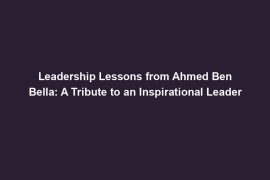Hey there, leadership enthusiasts! Today, we’re diving into the fascinating world of Abdelaziz Bouteflika, a former leader with a leadership style worth studying. You might be wondering, who is this Bouteflika guy anyway? Well, let me fill you in.
Abdelaziz Bouteflika was a prominent political figure in Algeria, serving as the President for 20 years from 1999 to 2019. Known for his strategic approach to power and governance, Bouteflika’s leadership style was marked by a focus on stability and order, often prioritizing these over democratic principles. This approach allowed him to build alliances and maintain control over the political landscape, effectively handling dissent and opposition with a firm hand.
Studying leaders like Bouteflika can provide valuable insights into effective leadership strategies and the challenges of balancing domestic and international priorities. By understanding his methods and decisions, we can learn important lessons about the complexities of leadership in diverse political contexts.
So, grab a seat and get ready to delve into the key leadership lessons we can draw from Abdelaziz Bouteflika’s tenure. It’s going to be an enlightening journey, so stay tuned for more!
Key Leadership Lessons from Abdelaziz Bouteflika
Abdelaziz Bouteflika, the former President of Algeria, may have left office in disgrace, but his leadership style and strategies offer valuable lessons for aspiring leaders. Let’s delve into some key takeaways from his political career:
Prioritizing stability and order over democratic principles
Bouteflika’s regime was known for prioritizing stability and order above all else, often at the expense of democratic principles. While this approach may have kept the country relatively peaceful for a time, it ultimately led to a lack of accountability and widespread corruption.
Building alliances and maintaining power through strategic relationships
One of Bouteflika’s strengths as a leader was his ability to build alliances and maintain power through strategic relationships. By aligning himself with key political players and power brokers, he was able to solidify his grip on power for decades.
Handling dissent and opposition with a firm hand
Bouteflika was not known for tolerating dissent or opposition. His regime cracked down harshly on protestors and critics, using tactics that violated human rights and democracy. While this may have helped him stay in power, it also led to widespread discontent and unrest.
Balancing domestic and international priorities for political survival
One of the biggest challenges for leaders like Bouteflika is balancing domestic and international priorities. By focusing on maintaining power domestically while also navigating the complexities of international relations, he was able to stay in power for many years.
By studying leaders like Abdelaziz Bouteflika, we can gain valuable insights into the complexities of leadership and the challenges that come with it. While his methods may not always be ethical or sustainable in the long run, there are still lessons to be learned from his strategies and decisions.
Implications for Current and Future Leaders
Let’s dive into how the leadership lessons of Abdelaziz Bouteflika can be applied to current and future leaders. It’s essential to understand the relevance and applicability of his approach in today’s fast-paced world.
Adaptability and Flexibility in Leadership Approaches
One crucial aspect that leaders can learn from Bouteflika is the importance of adaptability and flexibility in leadership styles. While he prioritized stability and order, it’s essential for leaders to evolve and adjust their strategies to meet the changing needs of society. In a rapidly changing world, being able to pivot and adapt to new challenges is a valuable skill for leaders in any field.
Contrasting Leadership Styles
It’s also vital for leaders to compare and contrast different leadership styles to determine what works best in their specific context. While Bouteflika’s firm-handed approach may have worked for maintaining power and stability, more progressive and inclusive models of leadership have gained popularity in recent years. By examining a range of leadership styles, leaders can tailor their approach to best suit the needs of their organization or country.
Reflection on Ethical Implications
Lastly, leaders should take a moment to reflect on the ethical implications of prioritizing stability over democracy. While ensuring stability is essential for a functioning society, leaders must also uphold democratic principles and respect the rights of their citizens. It’s a delicate balance that requires careful consideration and a deep understanding of the complex issues at play.
In conclusion, studying leaders like Abdelaziz Bouteflika can provide valuable insights for current and future leaders. By examining his leadership lessons, leaders can learn the importance of adaptability, contrast different styles, and reflect on the ethical implications of their decisions. Effective leadership requires a combination of strategic thinking, adaptability, and a commitment to ethical principles – lessons that all leaders can benefit from.


